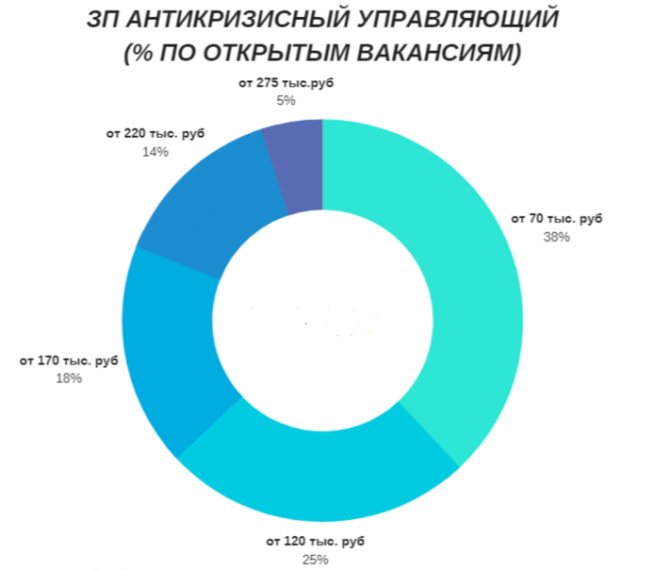An anti-crisis manager is a senior manager whose direct responsibility is to minimize and prevent such unfavorable situations for the company as an irrational business strategy, suddenly developing negative and uncontrollable market conditions, or eliminating the consequences of mistakes made by analysts and accounting departments.
- Short review
- Summary
| Salary | from 70,000 rubles | ||
| Schedule | Full day | ||
| Education | Higher | College | Courses |
| Market demand | 204 open vacancies | ||
| Age of candidates | ~ 30 – 65 years | ||
Table 1. Main characteristics of the profession
Download resume templates: 1_template
2_template
3_template
4_template
5_template
6_template
7_template
8_template
9_template
10_template
Responsibilities
The responsibilities of an anti-crisis manager include a wide range of tasks; the behavior strategy implies the following actions:
- Analyzes the situation in order to exclude unnatural bankruptcy.
- Analyzes the existing business model, identifies its advantages and disadvantages.
- Develops an action plan to get out of the current situation with minimal losses.
- Participates in court proceedings.
- Notifies creditors of the company's bankruptcy. Reviews and compiles a register of requirements.
- Conducts inventory and protection of enterprise property, formalizes property rights.
- Takes control of activities and conflicts.
- Bears personal responsibility for decisions made.
Requirements
Here you can’t do without the ability to think strategically and analyze the current situation. Let’s move on to consider the business qualities of a financial attorney who manages a company in a crisis. Considering the specifics of such work, it is impossible to do without perseverance and the ability to achieve your goals. In addition, the manager cooperates with an enterprise that is in decline.
Such circumstances give rise to disputes, and this situation requires the ability to competently resolve the conflict.
The main goal of such a person is to avoid the collapse of the organization. Accordingly, the skill of planning strategic tasks and the experience of step-by-step recovery from a crisis with minimal damage will be useful here.
Finding a way out of difficult situations in a short time is another important quality. Such people instantly make the right decision to a problem, taking into account the likely risks and obstacles.
Attention! In such a case, a balanced approach to work and the absence of an emotional view of the problem becomes a significant advantage.
The ability to correctly justify your own position and firmness in moving towards your goal are useful qualities
Don't miss: St. Petersburg State University tuition fees in 2020-2021
The conflict situation that arises due to the current situation and external pressure become the reason for testing the applicant for this position for resistance to stress and communication skills.
Here, efficiency and accuracy in working with papers are considered relevant character traits. In addition, the ability to clearly explain one’s own position also becomes an important criterion.
The manager sees probable prospects for economic growth, which indicates an analytical mindset and systems thinking.
Moreover, this employee ensures the preservation of the material asset of the enterprise, using legal methods of repaying debts or attracting new capital. This moment speaks of creativity and the ability to look for non-standard solutions to the problem.
Salary
In Russia it varies from 70 to 280 thousand rubles.
Moscow
Salary in Moscow is from 90 thousand to 280 thousand rubles.
St. Petersburg
The average salary is 110 thousand rubles.
Other regions
The salary for the vacancy varies from 70 to 150 thousand rubles.
Average for the CIS
The average salary in the CIS is 90 thousand rubles.
In perspective
It is worth noting that the salary of an anti-crisis manager is unstable. In addition to the fixed amount, the company pays interest, which depends on the financial capabilities of the enterprise and the amount of work done by the manager.

Diagram 1. Salary dynamics by year

Diagram 2. Distribution of wages by region
Scope of employment of the anti-crisis manager and his appointment
Among the huge number of management professions, crisis management is the most risky field of activity, since the position of the enterprise and the reputation of the specialist directly depend on the effectiveness of its methods.
Extrajudicial activities to improve the health of an enterprise and get it out of a difficult situation are the competence of an anti-crisis manager, and judicial activities are the competence of an arbitration manager. The success of the entire implemented program depends on the professionalism and energy of a leader of this rank.
The anti-crisis manager must have an excellent understanding of the current situation and have special knowledge, clearly defining the sequence of his activities, including the main stages of the enterprise’s state (pre-crisis situation, crisis, recovery stage, elimination of the consequences of the crisis) and knowledge of its features (production, mission, goals, methods of stimulation , structure, levels of control).
The developed strategy should be aimed at financial recovery, elimination of debts, implementation of programs to restore effective activities and stimulate staff to be productive. If such a solution to problems is impossible, a profitable sale of the enterprise and elimination of existing debts should be implemented.
Anti-crisis managers are a profession in demand, so quite developed enterprises often turn to their services. For this reason, the competence of such a specialist should include all economic and legal knowledge of doing business, operational analysis of documentation and development of plans for the implementation of anti-crisis programs. When studying materials and the real potential of an enterprise, it is important to be an expert who understands the current situation in detail, to perform the functions of an experienced organizer and diplomat, because the ultimate goal of such activity is to develop an anti-crisis strategy in the shortest possible time (usually a year and a half). Further implementation and responsibility for the consequences fall entirely on the anti-crisis manager.
Its activities are strictly controlled by the licensing departments, the trade and industry department and the insolvency monitoring authorities, which determine penalties in case of violations. This may be: a warning and recommendations for eliminating non-compliances, a fine, a ban on activities for a certain period (from 1 to 15 years), compensation for losses caused. This provision provides for a high degree of responsibility in relation to the opposing parties - creditors and the debtor enterprise.
Based on the above materials, we can conclude: the activities of an anti-crisis manager can reflect two directions - reformation or liquidation.
Distribution of open vacancies by region
Distribution of relevant vacancies on the labor market by region.
Statistics do not take into account data from regional job sites
Moscow
52 open vacancies
St. Petersburg
17 open vacancies
Regions of the Russian Federation
- Republic of Tatarstan: 6
- Samara region: 5
- Primorsky Krai: 4
- Republic of Khakassia: 4
- Kemerovo region: 4
- Penza region: 4
- Komi Republic: 4
- Moscow region: 4
- Khabarovsk Territory: 3
- Omsk region: 3
- Sverdlovsk region: 3
- Belgorod region: 3
- Kursk region: 3
- Kamchatka Territory: 2
- Magadan region: 2
- Sakhalin region: 2
- Chukotka Autonomous Okrug: 2
- Irkutsk region: 2
- Krasnoyarsk region: 2
- Novosibirsk region: 2
- Altai Territory: 2
- Perm region: 2
- Tyumen region: 2
- Republic of Bashkortostan: 2
- Nizhny Novgorod region: 2
- Vladimir region: 2
- Ivanovo region: 2
- Voronezh region: 2
- Lipetsk region: 2
- Oryol region: 2
- Tula region: 2
- Arkhangelsk region: 2
- Kaliningrad region: 2
- Republic of Karelia: 2
- Amur region: 1
- Republic of Buryatia: 1
- Republic of Tyva: 1
- Republic of Sakha (Yakutia): 1
- Transbaikal region: 1
- Tomsk region: 1
- Kurgan region: 1
- Chelyabinsk region: 1
- Krasnodar region: 1
- Republic of North Ossetia-Alania: 1
- Volgograd region: 1
- Orenburg region: 1
- Ulyanovsk region: 1
- Udmurt Republic: 1
- Chuvash Republic: 1
- Vologda region: 1
- Tver region: 1
- Yaroslavl region: 1
- Kaluga region: 1
- Tambov region: 1
- Murmansk region: 1
Ukraine
- Dnipropetrovsk region: 2
- Odessa region: 2
- Kyiv: 1
- Vinnytsia region: 1
- Donetsk region: 1
- Zaporozhye region: 1
- Ivano-Frankivsk region: 1
- Rivne region: 1
- Kharkov region: 1
Belarus
Below in the article you will find active vacancies
Who are arbitration managers, why are they needed and why do they unite in SROs?
Arbitration managers are persons without whom the bankruptcy process of a legal entity or individual is impossible. The manager is appointed by the court as a general rule, but the applicant may well nominate a candidate.
The essence of the activity of the appointed person is the organization and conduct of the bankruptcy process, namely: searching and convening creditors, identifying the debtor’s property for inclusion in the bankruptcy estate, organizing tenders for the sale of assets, representation in court and other functions. Of course, managers do not operate for free. They are entitled to remuneration for their work.
SRO, in turn, is an association of professionals. Moreover, professionals do not unite on a commercial basis, and even if the SRO earns money, it is not divided among the members, but goes towards ensuring the functioning of the company.
The associations themselves are divided on a professional basis, that is, there are SROs of arbitration managers, SROs of builders, SROs of appraisers, and so on.
To become a member of an SRO, a manager must have a higher education and a certain amount of work experience, pass an exam and have no criminal record or other types of punishment for offenses.
What do they require?
The vacancy of an anti-crisis manager requires perfect knowledge in economics, finance and management.
Education
A higher education degree in crisis management is required. Some companies consider candidates without specialized education, but with a certificate confirming completion of training in courses for crisis managers.
- Higher
- Courses
The average cost of training is 65 - 298 thousand rubles per year / 4 years. Budget places, usually up to 10 per stream.
| University | Cost of a year of study, rub. | Budget places |
| Moscow State University of Humanities and Economics | from 65 000 | 18 |
| Institute of Economics and Crisis Management | from 97 000 | 0 |
| National Research University Higher School of Economics | from 298,000 | 0 |
Table 2. Average cost of training per year.
The average cost of courses is 50,000 rubles, study time is 50 academic hours.
| Courses | Tuition fee, rub. | Training period | Online |
| uprav | 47 000 | 5 days | No |
| idomfua | 40 000 | 4 days | No |
Table 3. Average prices and conditions for taking advanced training courses.
Average age
The average age of a sought-after specialist is 30–45 years. However, age does not play a significant role; professionalism and business connections are more important.

Figure 2. Average age of “Anti-crisis manager”
Skills
In order to become an anti-crisis manager, you must combine the following functions:
- stress resistance;
- multitasking;
- determination;
- communication skills, negotiation skills;
- rationality;
- rigidity in decision making;
- analytical and systems thinking;
- ability to quickly make decisions in difficult situations;
- ability to resist external influence;
- high performance, including in situations of uncertainty and lack of information;
- ability to set goals and prioritize;
- ability to correctly convey information at different levels;
- unconventional thinking, the ability to find non-obvious prospects and opportunities.
experience
Employees with successful experience and management practice are most in demand.
Diagram 4. Required work experience
Arbitration managers
Home > Arbitration managers
If you are determined to obtain the status of an arbitration manager and devote yourself to this difficult, but interesting and promising profession, this program is for you! Professional retraining in
The specialty of an arbitration manager is one of the most in demand in the labor market nowadays. An insolvency manager is always relevant as long as the market economy itself exists, because thousands of enterprises around are going bankrupt, and this is a natural process. The training contributes to the formation of mutually beneficial partnerships with business practitioners, the acquisition of new business contacts in the professional field among students and graduates of the program.
The purpose of the unified training program is to obtain new competencies necessary for professional activities as arbitration managers.
The main objective of the unified training program is to provide up-to-date knowledge from practicing teachers and professionally prepare students to pass the theoretical exam in Rosreestr.
Advantages of the program : The Kirov Institute of Agribusiness and Human Resources (Institute) has been training arbitration managers for 20 years! During this time, more than 600 arbitration managers were trained and successfully passed the exam. The Institute occupies a leading position in the Kirov region in training arbitration managers. An agreement on cooperation in solving the problems of training (retraining) arbitration managers was signed between the Institute and the Federal Service for State Registration, Cadastre and Cartography (Rosreestr), which allows this activity to be carried out. There is also fruitful cooperation with self-regulatory organizations (SROs) of arbitration managers.
Category of listeners: lawyers, economists, appraisers, specialists in crisis management, financial recovery, expanding the scope of their activities; arbitration managers; civil servants; business owners; employees of banking structures and other credit organizations.
List of documents for admission:
- a copy of a state diploma of higher education, certified by a notary,
- copy of the passport,
- listener application form.
The duration of training is 572 academic hours and contains the following training modules:
- Legal support for bankruptcy procedures.
- Legislation of the Russian Federation on bankruptcy.
- Economic support for arbitration management and the activities of arbitration managers.
- Legislation of the Russian Federation on valuation activities.
- Practice of an arbitration manager.
Upon completion of the course you will receive:
— Diploma of professional retraining and you will be allowed to take the theoretical exam under the unified training program for arbitration managers; - after successfully passing the exam - Certificate of passing the theoretical exam under the unified training program for arbitration managers (issued by Rosreestr).
Form of study: full-time (on weekdays in the evenings and on weekends).
Duration of training: 7 months. Beginning of training : upon completion of the group The cost of training is 36,000 rubles.
Phones: 62-95-86, 62-95-87.
E-mail * Training of anti-crisis managers is carried out in accordance with current legislation according to the Unified Training Program for Arbitration Managers, approved by order of the Ministry of Economic Development of the Russian Federation dated December 10, 2009 No. 517. Has been active at the Institute since 1998.
Upcoming training dates
| date | Name | Lecturer | Form of study |






